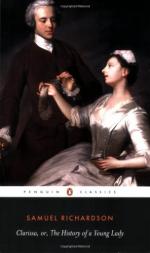’The Virtues and Graces are this Lady’s handmaids. She was certainly born to adorn the age she was given to.’—Well said, Jack—’And would be an ornament to the first dignity.’ But what praise is that, unless the first dignity were adorned with the first merit?—Dignity! gew-gaw!— First dignity! thou idiot!—Art thou, who knowest me, so taken with ermine and tinsel?—I, who have won the gold, am only fit to wear it. For the future therefore correct thy style, and proclaim her the ornament of the happiest man, and (respecting herself and sex) the greatest conqueror in the world.
Then, that she loves me, as thou imaginest, by no means appears clear to me. Her conditional offers to renounce me; the little confidence she places in me; entitle me to ask, What merit can she have with a man, who won her in spite of herself; and who fairly, in set and obstinate battle, took her prisoner?
As to what thou inferrest from her eye when with us, thou knowest nothing of her heart from that, if thou imaginest there was one glance of love shot from it. Well did I note her eye, and plainly did I see, that it was all but just civil disgust to me and to the company I had brought her into. Her early retiring that night, against all entreaty, might have convinced thee, that there was very little of the gentle in her heart for me. And her eye never knew what it was to contradict her heart.
She is, thou sayest, all mind. So say I. But why shouldst thou imagine that such a mind as hers, meeting with such a one as mine, and, to dwell upon the word, meeting with an inclination in hers, should not propagate minds like her own?
Were I to take thy stupid advice, and marry; what a figure should I make in rakish annals! The lady in my power: yet not have intended to put herself in my power: declaring against love, and a rebel to it: so much open-eyed caution: no confidence in my honour: her family expecting the worst hath passed: herself seeming to expect that the worst will be attempted: [Priscilla Partington for that!] What! wouldst thou not have me act in character?
But why callest thou the lady innocent? And why sayest thou she loves me?
By innocent, with regard to me, and not taken as a general character, I must insist upon it she is not innocent. Can she be innocent, who, by wishing to shackle me in the prime and glory of my youth, with such a capacity as I have for noble mischief,* would make my perdition more certain, were I to break, as I doubt I should, the most solemn vow I could make? I say no man ought to take even a common oath, who thinks he cannot keep it. This is conscience! This is honour!—And when I think I can keep the marriage-vow, then will it be time to marry.
* See Vol. III. Letter XXIII. Paragr. 4.




